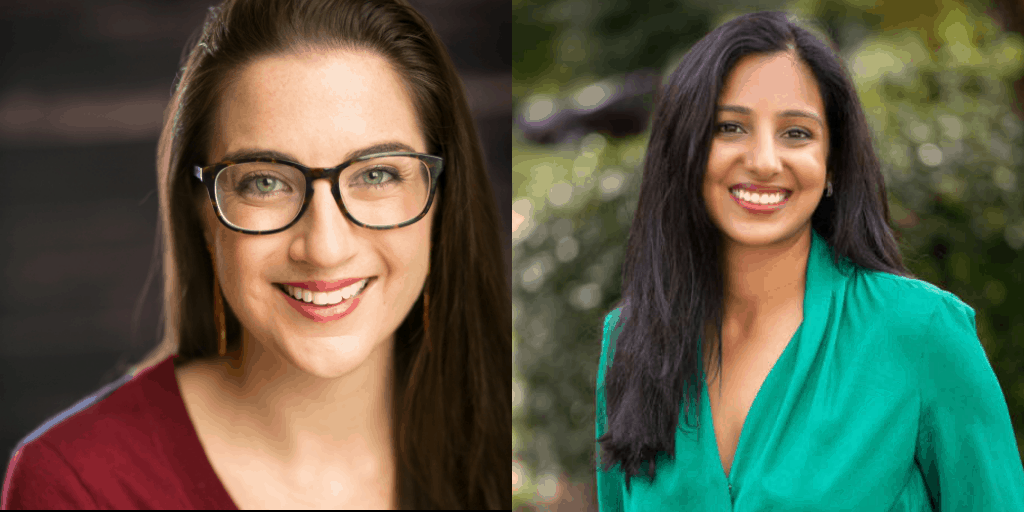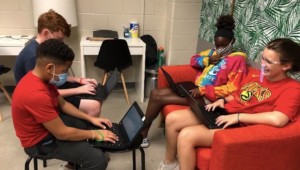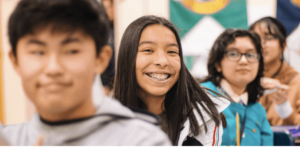Podcast: Julia Freeland Fisher and Mahnaz Charania on Social Relationships and Networks

In today’s episode, Tom is joined by Julia Freeland Fisher and Dr. Mahnaz Charania. Julia is the Director of Education Research at the Clayton Christensen Institute and the author of the important 2018 book, Who You Know: Unlocking Innovations That Expand Students’ Networks. Dr. Mahnaz Charania is a Senior Research Fellow, also at the Clayton Christensen Institute.
Recently, Julia Freeland Fisher and Dr. Mahnaz Charania co-authored an incredibly important new paper together called, “The Missing Metrics: Emerging Practices for Measuring Students’ Relationships and Networks.” The paper outlines how measuring for diversity and social capital can open new doors and perspectives for students at various junctures in their education journey. Through this, education systems can start to build an evidence base for closing the social side of opportunity gaps and ensure that all students are supported equitably in their path to economic prosperity.
Join in for the conversation as Tom, Julia, and Dr. Mahnaz discuss the four-dimensional framework for measuring students’ social capital they’ve proposed in their paper, “The Missing Metrics,” and why social capital needs to be taken into account when addressing equity, access, and more.
How do you measure social capital:
1. Quantity of relationships measures who is in a student’s network over time. The more relationships students have at their disposal, the better their chances of finding the support they need and the opportunities they deserve.
2. Quality of relationships measures how students experience the relationships they are in and the extent to which those relationships are meeting their relational, developmental, and instrumental needs. Different relationships offer different value as students’ needs evolve.
3. Structure of networks gauges the variety of people a student knows and how those people are themselves connected. Different people with varied backgrounds, expertise, and insights can provide students with a wide range of options for discovering opportunities, exploring interests, and accessing career options.
4. Ability to mobilize relationships assesses a student’s ability to seek out help when needed and to activate different relationships. Connecting a student to relationships isn’t enough. Young people must be able to nurture relationships and recognize how and when to leverage relationships as resources in their life journey.
Today, more than ever, students need access to the right resources to navigate uncertain times. Young people need relationships that provide critical care, support, and encouragement. They also need relationships that can expand their options and connect them to new opportunities—like advice, jobs, and learning experiences. Leveling the playing field of opportunity for students will require measuring relationships as assets in the student success equation
Key Takeaways:
[:10] About today’s episode.
[:55] Tom welcomes Julia Freeland Fisher and Dr. Mahnaz Charania to the podcast.
[1:28] Dr. Mahnaz Charania shares why she decided to study experimental social psychology.
[2:02] What sparked Dr. Mahnaz Charania’s interest in education?
[3:13] Julia Freeland Fisher recaps her career journey from her early work around blended learning to social capital.
[5:48] Dr. Mahnaz Charania shares what interests her about the work she is currently doing around social capital.
[6:32] Julia shares what she would add to the 2020 epilogue of her 2018 book, Who You Know, with regards to the pandemic.
[11: 33] The backstory behind the comprehensive measurement framework that is outlined in Julia Freeland Fishers and Dr. Mahnaz Charania’s paper, “The Missing Metrics: Emerging Practices for Measuring Students’ Relationships and Networks.”
[12:50] How Dr. Mahnaz Charania is addressing social capital through a continuous improvement approach.
[14:33] The four-dimensional framework for measuring students’ social capital: quantity of relationships, quality of relationships, the structure of networks, and the ability to mobilize relationships.
[14:39] How to measure the quantity of relationships and why it matters.
[18:44] How to measure the quality of relationships, why it is a key aspect in the four-dimensional framework, and some examples.
[22:30] About the structure of networks, why it is important, and how to measure it.
[24:39] About Getting Smart’s sponsor this week, Micro-Collegiate Academy by TEL Education.
[25:51] About the last of the four categories, the ability to mobilize relationships, and how to measure it.
[27:00] The benefits of using extended transcripts or portfolios in helping young people tell the story of who they’re becoming, what they’ve accomplished, what they’ve overcome, and who they’ve connected with.
[30:33] Examples of fantastic online digital extended transcripts or portfolios and what great extended transcripts and portfolios should include.
[33:04] Why continuous improvement/self-growth is a key component in measuring these metrics.
[35:00] How educators and institutions can help students build their networks (especially during the pandemic).
[36:59] Dr. Mahnaz Charania’s advice for principals and counselors on where to start.
[38:25] Julia’s advice for principals and counselors on where to start.
[40:07] Are these emerging metrics just as important as your reading or math score?
Mentioned in This Episode:
- Clayton Christensen Institute
- Who You Know: Unlocking Innovations That Expand Students’ Networks, by Julia Freeland Fisher
- “The Missing Metrics: Emerging Practices for Measuring Students’ Relationships and Networks”
- Center for Disease Control and Prevention (CDC)
- CARE International
- Critical Mentoring: A Practical Guide, by Torie Weiston–Serdan
- The Power of Place: Authentic Learning Through Place–Based Education, by Tom Vander Ark, Emily Liebtag, and Nate McClennen
- Trovvit
- Big Picture Learning
- ASU Local
- xSEL Labs
- Micro–Collegiate Academy | TEL Education
- Greenlight Credentials
- Climb Hire
- CareerVillage
- Nepris
- Getting Smart Podcast Ep. 165: “Why Youth Need Social Capital and How Schools Can Help” (A 2018 interview with Julia Freeland Fisher)








0 Comments
Leave a Comment
Your email address will not be published. All fields are required.